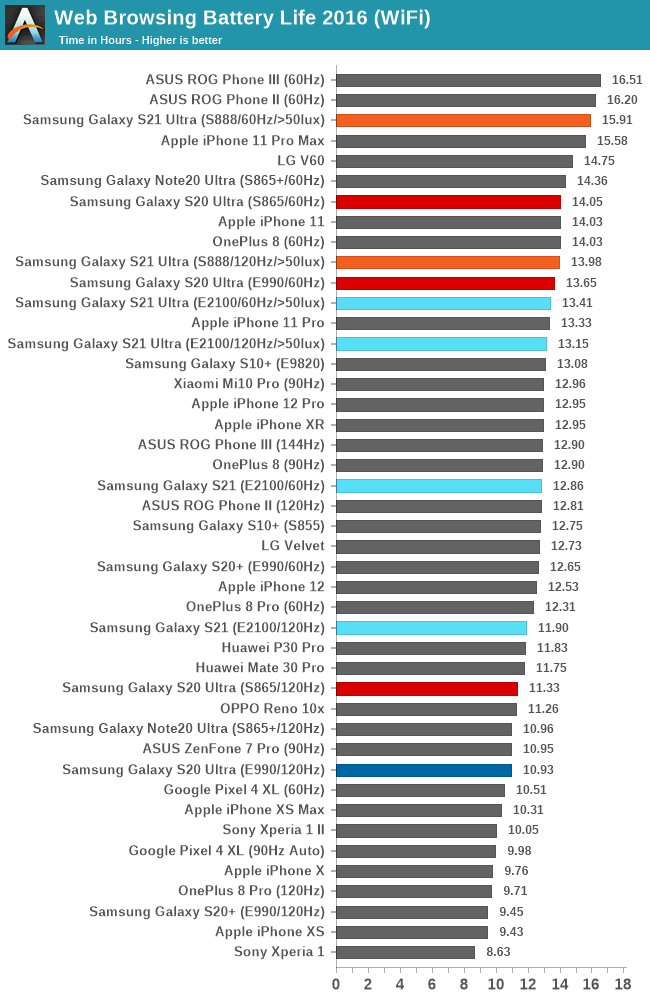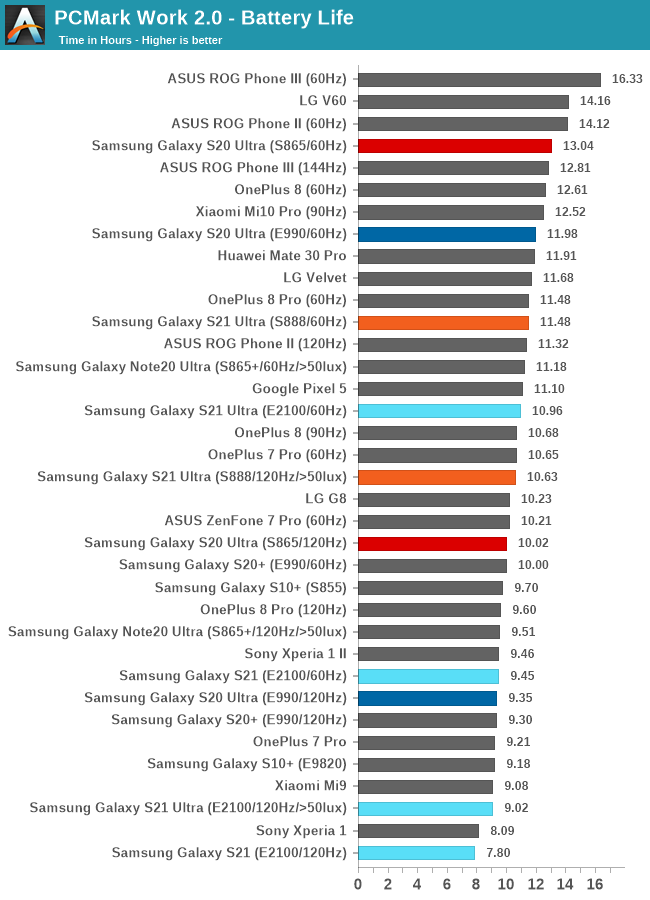The Samsung Galaxy S21 Ultra & S21 Review: The Near Perfect and The Different
by Andrei Frumusanu on February 22, 2021 12:00 PM EST- Posted in
- Smartphones
- Samsung
- Mobile
- Galaxy S21
- Galaxy S21 Ultra
Battery Life - Actually Great
Battery life of the S21 series is interesting as there’s two opposing factors that come into play. We’ve seen that this generation of SoCs are actually less energy efficient than last year’s iterations during interactive workloads. This comes at the benefit of higher performance, but generally it’s accurate that the new chips use more power. On the other hand, we also have more efficient displays, and high-refresh-rate operating modes.
On the Galaxy S21 Ultra, both software and hardware adaptive frequency work on a frame basis, allowing it the maximum power efficiency benefits even during 120Hz operation. Together with the much more luminance efficient screen, we should be looking at outstanding battery efficiency.
The regular S21 is more interesting as we hadn’t had the opportunity to see Samsung’s adaptive refresh mode on a display which doesn’t support hardware LFD. Here, the mode switching between 120Hz and 60Hz is on a coarser software level – the display will switch to 60Hz on static screens, but only after around a second of inactivity. That’s actually still great for power efficiency compared to the constant 120Hz of the S20 series, which means that in general every-day scroll-and-read behaviour, the 120Hz mode of the S21 and S21+ should still be much more efficient than their predecessors.

In our web-browsing test, the results here are slightly different to our provisional test results we had published a few weeks ago- notably on the 120Hz runs.
Nevertheless, the results for the S21 Ultra are outstanding. Even though in theory the SoC is more power hungry, the new display is so much more efficient, that we’re seeing the S21 Ultra takes a large lead of 13% at 60Hz for the Snapdragon variant. The generational differences for the Exynos variants here is much smaller due to how more much responsive and aggressive the new SoC is, which mostly counteracts the new luminosity efficiency of the screen.
In 120Hz mode, the new Ultra devices both take massive leaps over their predecessors- showcasing the new adaptive frequency and LFD mechanisms and how they make 120Hz viable in every-day usage.
Even the smaller S21, the software based adaptive refresh helps a lot as the shift from 60Hz to 120Hz now only costs around 8% in battery life, whereas last year on the S20+ it had a +25% impact.
People will notice the Snapdragon S21 Ultra has a larger delta between its 60 and 120Hz modes, and I think that’s because for some reason the Snapdragon 888 behaves much less aggressive in its 60Hz setting, while the Exynos S21 is tuned to be equally responsive regardless of refresh rate, which is a software discrepancy between the two phones.

Overall Battery Life: Great
In general, the S21 Ultra’s battery life is just fantastic thanks to the new generation display and its heightened power efficiency. The advantages here will vary depending on how you use it – if you tend to use it in dim environments at lower brightness, you might not see the improvements as much as if you’re in a bright scenario and tend to use your phone at high brightness levels. The brighter it will be, the better the S21 Ultra will fare. In super bright scenarios, the phone will be unmatched.
For the S21, and likely applicable to the S21+ as well, battery life is also great. While not as powerful as the Ultra’s adaptive refresh mechanisms, the new software-based implementation on the S21 means that 120Hz is also a very viable option this generation.
While we’re seeing battery life this generation still favour the Snapdragon chips, the Exynos this year isn’t all that far behind, and given the general user experience equality between the two phones, it’s not a major point of contention anymore.










122 Comments
View All Comments
TwoMetreBill - Monday, February 22, 2021 - link
Until we can see the results of the raw images processed in something like Lightroom, we won't really know what we can get from this system. The smaller the sensor, as a general rule, the greater the improvement from raw shooting. But as far as I can tell, nobody has published a raw sample library and I search every day.s.yu - Wednesday, February 24, 2021 - link
Just get a compatible version of Gcam running. With SD Samsung it's the easiest to find.tkSteveFOX - Tuesday, February 23, 2021 - link
Again, Huawei's Kirin 9000 knocks it out of the park. A better chip all-round.Samsung's 5nm is not even as good or roughly on par with TSMCs 7nm.
Getting an SD870 looks like a better deal this year, but if Huawei manage to produce a $800 Kirin 9000 device that would be the best of the best.
I am amazed how their massive GPU doesn't throttle as much as both Adreno 660 and MP14 in the E2100.
iphonebestgamephone - Tuesday, February 23, 2021 - link
Maybe being slow and wide is the best?s.yu - Wednesday, February 24, 2021 - link
The guy wasn't paying attention. The Adreno throttled far more than it was supposed to with the whole SoC settling down at 3W when it should have nearly 5W to use. And in several benchmarks the Kirin wasn't that fast either, so he's completely confused.And yes slow and wide has always been better but that only applies to the Mali comparison.
iphonebestgamephone - Thursday, February 25, 2021 - link
Yeah the sd samsung seems to throttle too much, while the mi 11 doesnt want to throttle.yeeeeman - Tuesday, February 23, 2021 - link
underwhelming. on the system performance page we can clearly see the s20 ultra w/ sd 865 being barely slower and you say the performance is outstanding. Sure, it is outstanding, but it isn't an improvement over the last gen. Battery life, again, similar. the only improvement is the gpu and the display efficiency.s.yu - Wednesday, February 24, 2021 - link
I have to agree.flyingpants265 - Friday, February 26, 2021 - link
Slower? The speed is not going to matter for 99% of users so I'm not sure what you're talking about there. Who cares?The Android OS and software suck so bad. We've had 14 generations of laggy phones now..
iphonebestgamephone - Saturday, February 27, 2021 - link
”The Android OS and software suck so bad. We've had 14 generations of laggy phones now..”So what they care about is lag? Half a second of stutter is what they care more about, than the general speed?